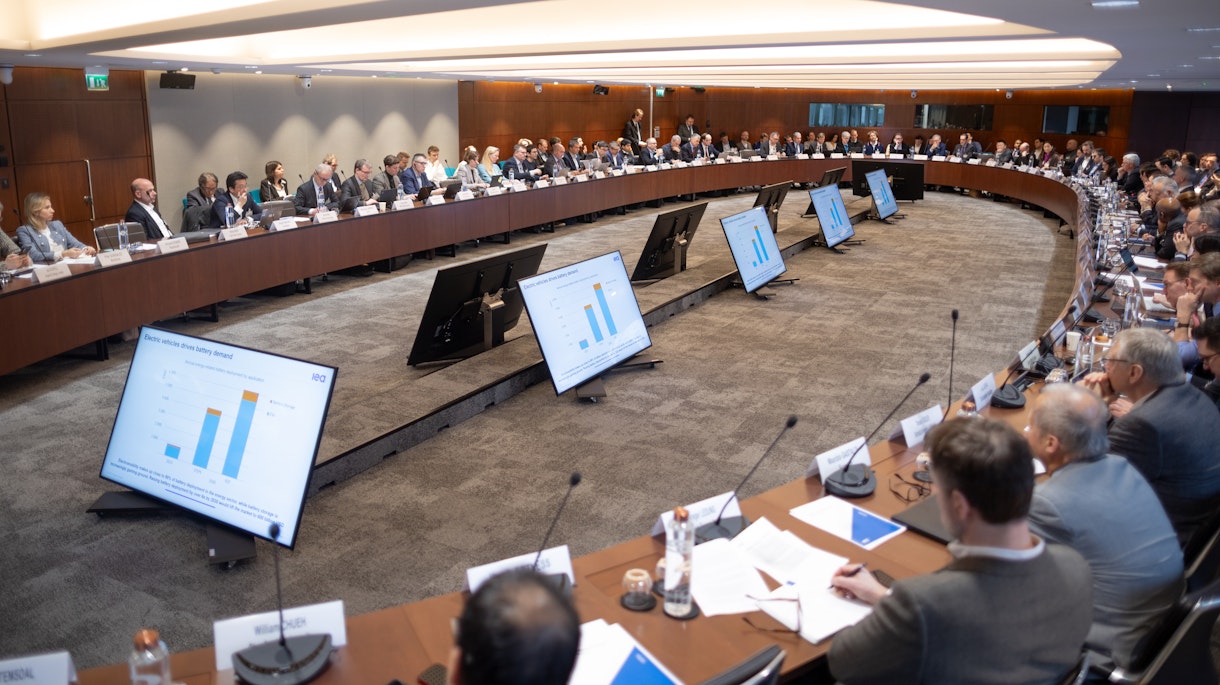High-level IEA workshop brings together international thought leaders to discuss the importance of batteries in clean energy transitions
News

Ahead of new special report, representatives from government, industry, finance, academia and beyond address batteries’ multiple roles in meeting energy and climate goal
Some 100 experts from over 20 countries and regions – including Africa, Latin America, India and China – came together today at a high-level event hosted by the IEA to discuss the role of batteries in delivering on the clean energy transition commitments made at the recent COP28 climate summit in Dubai. These commitments include the 2030 goals of accelerating the transition away from fossil fuels, tripling renewable energy capacity and doubling energy efficiency progress.
Representatives taking part in the high-level workshop at IEA headquarters in Paris came from governments, international organisations, finance, civil society and industry, including battery producers accounting for 60% of global supply and the two largest electric car manufacturers. The discussions provide an essential input for the IEA’s upcoming special report on batteries, to be published in the first half of 2024.
The use of batteries throughout the energy sector is surging – with new records being set every year for the number of electric vehicles sold and the amount of battery energy storage installed in the power sector. Today, one in five cars sold worldwide is electric and an increasing amount of new solar projects, both large and small scale, are paired with batteries. But much more is required to shift to a pathway that is consistent with reaching international energy and climate goals.
Prior to COP28, the IEA’s updated Net Zero Roadmap identified key actions the world needs to take this decade to keep in reach the goal of limiting global warming to 1.5 °C. These include tripling global renewable energy capacity by 2030; doubling the rate of global energy efficiency improvements by 2030; ensuring the orderly decline of fossil fuel use; and scaling up clean energy investments in emerging and developing economies. All of these have been reflected in the COP28 outcome, which marks a historic turning point, but there is still much to do in terms of implementation. And for all those elements, batteries will play a critical role.
To deliver a tripling of renewable energy capacity, battery storage is a key to re-imagining how the electricity sector will work with rising shares of electricity from solar and wind.
To contribute to accelerating energy efficiency, electrification must move faster. This includes electric vehicles further increasing their market share, greater electricity use in industry, expanding electricity-based heating in advanced economies, and shifting to more electric cooking in emerging and developing economies.
“Batteries do so many important jobs in clean energy transitions, which is why the IEA is holding this high-level workshop and producing a new special report on them,” said IEA Executive Director Fatih Birol, who opened the event. “Electric vehicles reduce demand for oil in transport – and battery storage enables renewables to reduce the need for coal and natural gas in the power sector. At the same time, batteries bring energy security benefits by making grids more stable and reliable, and by providing flexibility to better match wind and solar output to consumer’s needs.”
Scaling up the use of batteries presents many opportunities across industrial supply chains. There has been a surge of recent announcements for new battery manufacturing facilities around the world, pointing to a more diverse supply of batteries in the years ahead.
But there are also risks that could keep batteries from fulfilling their potential in clean energy transitions. The supply of critical minerals used in batteries – particularly lithium, cobalt and nickel – is heavily concentrated in a small number of countries and needs to be scaled up significantly. In addition, policies and regulations in some markets don’t appropriately reflect the value of batteries in all their applications, risking undercutting business cases for investing in them.
As the world continues to scale up the deployment of batteries, drawing on technical and market experience to date can help inform decision making. In this context, the input provided at today’s high-level workshop, will enable the IEA’s upcoming special report on batteries to address the key issues in depth.